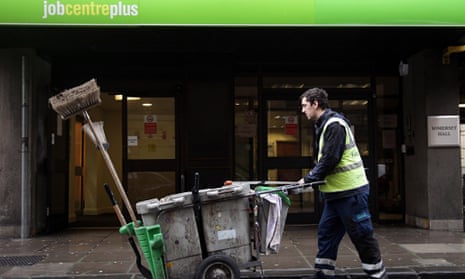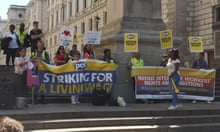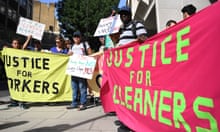This week, I met Luiz. He works as a cleaner at HMRC, the government department responsible for the administration of our tax system. Luiz and his wife are one of the “hard-working families” that our politicians so love to talk about: he leaves home most days at 4am, getting back at 9pm. He often works seven days a week. Why? Because of a choice made by Lin Homer, HMRC’s chief executive.
Cleaning services at HMRC are contracted out to a company, ISS. When its contract was recently put out to tender, ISS – in a practice which is becoming more and more common in the services sector – submitted two bids: one involved paying cleaners £9.15 an hour, the level considered enough to live on in London. But Homer didn’t choose that one. She chose the other bid, based on an hourly rate of £6.50 – the minimum wage. Luiz (which is not his real name) can’t live on that.
That’s why he goes to work at 4am, comes home at 9pm and often works weekends; he needs two jobs to survive. He has two teenage children who need their dad, but because he has to work two jobs, he’s not around much. With quiet desperation, Luiz explained to me how one of his children was getting into trouble at school, going off the rails.
Shame on you, Lin Homer: your cruel choice hurts that “hard-working family” every day, in ways that may never be repaired. But shame on all of us, too, for allowing the scandal of the working poor to persist for so long in our country.
My meeting with Luiz was arranged by Citizens UK, the brilliant community organisers who have been such a powerful force in campaigning for a living wage. But my real conversion to this cause was brought about years previously by an unlikely protagonist: Polly Toynbee. Over a decade ago I read Toynbee’s book, Hard Work, which chronicled the brutal conditions of those who work in Britain’s low-wage economy.
Coupled with the impact of Stephen Frears’ film Dirty Pretty Things, with its haunting line: “We are the people you do not see. We are the ones who drive your cabs. We clean your rooms. And suck your cocks,” doing something concrete about low pay became one of the things I most wanted to achieve with any influence I had.
There are millions of people in Britain today, like Luiz, who work full time and cannot live on what they earn. But that’s not the only scandal. The whole rotten system is made possible by tax credits that top up low pay – basically a subsidy to businesses for paying their workers too little. There is a simple policy solution: raise the legal minimum wage to the level of a living wage, and keep raising it to maintain its value as the cost of living rises.
Why hasn’t it happened? Mainly, it’s the argument that if you force employers to pay higher wages, you lose jobs. But remember, this is what was said about the minimum wage, including by people like, er, me.
As a Tory researcher I worked on blood-curdling – and in retrospect, utterly spurious – campaigns like Labour’s Jobs Axe that predicted millions more unemployed if ever a minimum wage were introduced. Of course, it didn’t happen.
Some might say that the minimum wage was deliberately set so low that it wouldn’t affect business very much. An increase to the living wage would be a completely different proposition. It is to counter this argument that in my book, More Human, I advocate what I describe as “business-friendly living wage” that requires companies to pay a living wage but cuts their employers’ national insurance by roughly the same amount to neutralise the overall impact. But to be honest, this is letting businesses off the hook. There are plenty that could perfectly well afford to pay the living wage. It’s a choice.
At the same time as meeting Luiz, I met Vicky O’Hare, managing director of a small food business based in east London. She chose to pay all her staff the living wage, and if she can anyone can. As she puts it, everyone who is employed costs somebody at least what the living wage is worth. Why should any employer be allowed to say: “I’m not paying you what you’re worth, I’ll let the taxpayer make up the difference.”
This argument is being heard right across the political spectrum. Labour and Conservative politicians alike object to unjustified subsidies to business – especially the large supermarkets and those others who simultaneously exploit their workers with poverty pay and make many hundreds of millions in profits every year. And of course it’s just as much a Conservative as a Labour principle that people should be able to live on what they earn. So this could be a rare moment in politics: one where both sides agree, and where a straightforward solution is readily available.
Let’s make the most of this moment, and just get it done. Introduce a compulsory national living wage and end the scourge of in-work poverty. It’s not going to solve all the problems of poverty and inequality – not by a long way. But it’s a start, and the summer budget next week offers the opportunity to make that start. Let’s not waste it.







